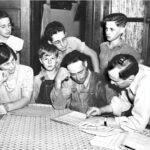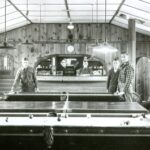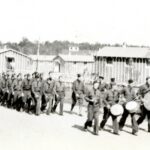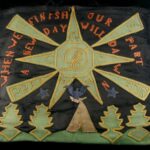Rose Mary Drab was born in southeastern Langlade County on April 23 of 1913. Her family had settled there the year before on a small farm south of Antigo. Originally named Drabowski, Rose Mary’s parents left Hungary for Chicago a few years beforehand, joining the large stream of European immigrants arriving in the upper Midwest at the turn of the twentieth century. Between 1880 and 1890, for example, half the village of Kolocein in Posen, Poland, had immigrated to the Antigo area of Langlade County. By 1900, 40% of the county’s population was German, Bohemian, or Polish. Churches and schools in the area held services and classes in Czech and German. Antigo alone boasted two German newspapers as well as a number of German and Czech social clubs.
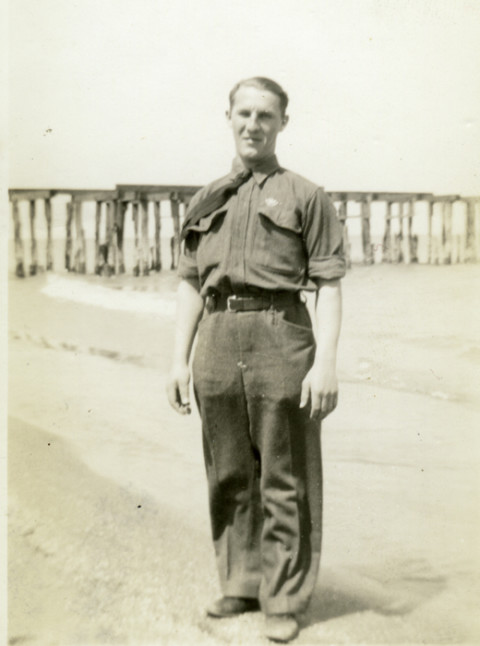
Immigrant families like the Drabs came to Wisconsin after hearing tales about the state’s fertile land and boundless opportunities. It’s possible that the Drab family, in particular, were drawn to the area thanks to the efforts of a Bohemian immigrant named Joseph Duchac. As a surveyor and land speculator, Duchac often traveled to Chicago to promote Langlade County to newly arrived immigrants like the Drabs who were eager to get out of the city and take up farming. He often accompanied his clients to Antigo and put them up in his home until they were able to purchase their own land from him. Thanks in part to boosters like Duchac, Langlade County had a significant population of eastern and central European settlers by the early decades of the twentieth century.
In 1923, after the death of her mother, young Rose Mary became the family caregiver at the age of 10 and took charge of a household that included her father and eight siblings. With the onset of the Great Depression in the early 1930s, Rose’s older brother Ed enrolled in the Civilian Conservation Corps and was assigned to Camp 657 at Summit Lake in northern Langlade County. Ed credited his CCC earnings and those of his younger brother who followed him into CCC Camp 657 with saving the family farm. Recruits like Ed and his brother were paid $30 per month, $25 of which they sent home to Rose and the Drab family.
With her older brother enrolled in the CCC, Rose Mary embroidered a number of knit items for Ed commemorating his service to the Corps. Her work serves as a fine example of Depression-era needlework from just one of many second-generation European women in the upper Midwest at that time.
Indeed, although her embroidery does not at all resemble the Hungarian style, it’s possible that her heritage—known for its embroidery—influenced her love for creating textiles. Ed displayed these items, including a pillow sham and a sweater vest with the letters “U.S. CCC 657,” proudly to his fellow recruits at camp, demonstrating his family sentiment and providing a small reminder of the comforts of his immigrant home within the simple confines of camp 657.
Four years later, in 1937, Rose Mary also embroidered a tapestry commemorating the CCC, which she sent to Franklin Delano Roosevelt. The tapestry hung in the White House and was later transferred to the Roosevelt Museum in Hyde Park, NY.
Ed and Rose Mary would each leave Langlade County for several decades, before returning in 1976 and 1982, respectively, to retire on the family farm. They lived in the farmhouse until their deaths—Ed in 2013 at the age of 101 and Rose Mary in 2015, also at the age of 101.
Written by Joe Hermolin.
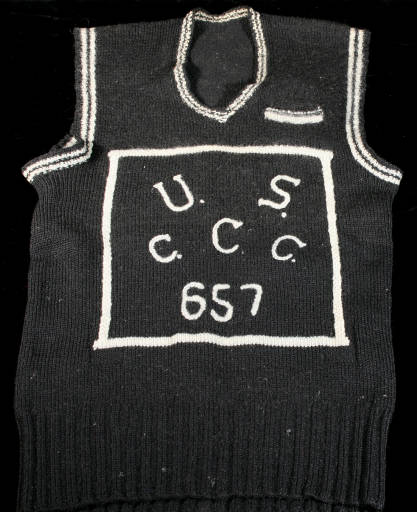
SOURCES
Interview with Edward Drab, 2007, Langlade County Historical Society archives.
Interview with Mary Masterton (a granddaughter) in the Langlade County Historical Society archives.
“Edward Drab Obituary,” Antigo Daily Journal, April 26, 2013.
“Rose Mary Drab Obituary,” Antigo Daily Journal, January 5, 2015.
L.W. Petrowski, “Polish Settlements in Langlade County,” 1962, unpublished manuscript on file in Langlade County Historical Society archives.
Letter from M.P. Hutchinson, President Langlade County Historical Society to Dr. Jeorg Nagler, Deutsches Historisches Institut, Washington D.C., July 18, 1989, on file in Langlade County Historical Society archives.
Phyllis Bidwell, “An Odyssey from Czechoslovakia,” The Antigo Daily Journal Express, September 6, 1994
Larry Van Goethem, Not Long Ago: 1879-1979, the Langlade County Centennial Story (Antigo, WI: Van Goethem, 1979), 39.
Czech social clubs are described in: Blanche Illichmann Meidel, “Ilichmann’s and Czech Plays by Children,” 1971, unpublished manuscript on file in the Langlade County Historical Society archives.
Also see material on other boosters in the region in: Robert M. Dessureau, History of Langlade County, Wisconsin (Antigo, WI: Berner Bros. Publishing Co., 1922), 103.
Antigo’s two German-language newspapers were the Antigo Banner (1919-1937) and the Antigo Herold (1901-1923).
